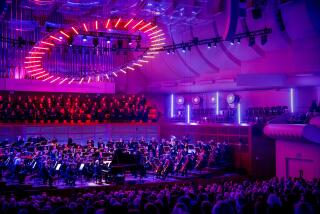Movie and music: It’s a package deal
- Share via
There are a lot of renowned collaborations between film directors and their favorite composers -- Steven Spielberg and John Williams, Alfred Hitchcock and Bernard Herrmann, Tim Burton and Danny Elfman. But it’s rare to find a film director who also serves as his own composer. Clint Eastwood is one; another is German-born director Tom Tykwer, whose latest movie, “Perfume: The Story of a Murderer,” opened in L.A. last week.
“Perfume” is based on a 1985 historical novel by elusive German writer Patrick Sueskind, one that’s been a bestseller in Europe since it first hit bookstands. Although directors as diverse as Stanley Kubrick, Martin Scorsese, Ridley Scott and Burton all were interested in filming the book, the author waited until 2001 to sell the rights to Bernd Eichinger, a persistent German film producer who chose Tykwer to direct, help write the screenplay and compose the music.
“I don’t consider it a luxury to be able to do all those jobs,” Tykwer (pronounced “Tick-vur”) said. Dressed in black, running his hand through his spiky black hair, the 41-year-old triple threat added, “I could never imagine myself doing a film without doing the music -- or at least being involved in the writing of the music.”
Tykwer may be best known to American movie audiences for “Run Lola Run,” the indie hit from 1998. Part of its success was Tykwer’s propulsive electronic score, which he composed in collaboration with Reinhold Heil and Johnny Klimek.
Tykwer, a classically trained pianist from age 8, later became hooked on film. Having no budget to hire a composer for his first movie, he took on the job himself.
The collaboration with Heil and Klimek came about when Tykwer booked studio time at Klimek’s studio in Berlin to record the music he’d written for the trailer for “Winter Sleepers,” his first feature. Tykwer heard songs that Heil and Klimek had recorded together and asked them to work with him on the full score; they agreed. Tykwer has worked with the two on all of his films since, most specializing in electronic music.
“Perfume,” whose plot turns on the uncanny sense of smell of the mostly mute leading character (played by Ben Whishaw), at first stymied the director. In the liner notes for the soundtrack (out on EMI Classics) he explained: “How do we treat the fact that this film is all about the realm of scents and odors? I realized that this could only be done through music. The analogy with music positively leaps out because the entire vocabulary of perfumery derives from music theory. In the perfume business, you also talk about chords and notes.”
In typical Tykwer fashion, script and score happened at the same time.
“We started writing the music from scratch when I joined the writing team, which was two years before filming began,” he recalled. “A huge chunk of the score was composed before the film was even financed.”
The advantage of working in this manner is clear to Tykwer.
“When the script and score grow parallel, you enter the shooting with a very strong understanding about both the atmosphere and the logics of the material. You even have the chance to play the music to the actors on set, and what’s most important, of course, is when you go into the editing room, you never have to touch any tempos. There’s just no logic to do the music at the end of the process -- whether you compose it yourself or not.”
Realizing that the historical setting (France in the 1800s) would call for a more classically inspired sound, the group eschewed its usual electronic instruments and wrote for orchestra. It made test recordings using a smaller ensemble, revealing what Tykwer called “the more abstract parts of a film -- suddenly you really understand so much about the atmosphere, about the emotions.”
The completed score, with its greatly expanded musical orchestrations, was played by the Berlin Philharmonic.
More to Read
Only good movies
Get the Indie Focus newsletter, Mark Olsen's weekly guide to the world of cinema.
You may occasionally receive promotional content from the Los Angeles Times.










